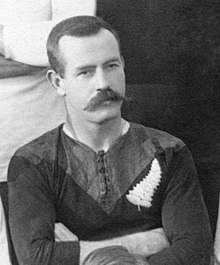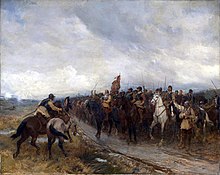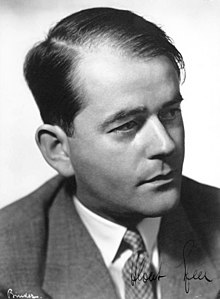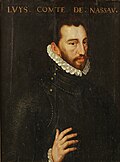Portal:History
The History Portal
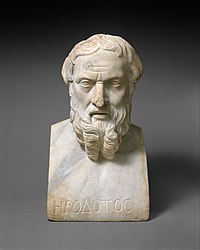
Herodotus (c. 484 BC – c. 425 BC) is often
considered the "father of history"
History (derived from Ancient Greek ἱστορία (historía) 'inquiry; knowledge acquired by investigation') is the systematic study and documentation of the human past.
The period of events before the invention of writing systems is considered prehistory. "History" is an umbrella term comprising past events as well as the memory, discovery, collection, organization, presentation, and interpretation of these events. Historians seek knowledge of the past using historical sources such as written documents, oral accounts, art and material artifacts, and ecological markers. History is incomplete and still has debatable mysteries.
History is an academic discipline which uses a narrative to describe, examine, question, and analyze past events, and investigate their patterns of cause and effect. Historians debate which narrative best explains an event, as well as the significance of different causes and effects. Historians debate the nature of history as an end in itself, and its usefulness in giving perspective on the problems of the present.
Stories common to a particular culture, but not supported by external sources (such as the tales surrounding King Arthur), are usually classified as cultural heritage or legends. History differs from myth in that it is supported by verifiable evidence. However, ancient cultural influences have helped create variant interpretations of the nature of history, which have evolved over the centuries and continue to change today. The modern study of history is wide-ranging, and includes the study of specific regions and certain topical or thematic elements of historical investigation. History is taught as a part of primary and secondary education, and the academic study of history is a major discipline in universities.
Herodotus, a 5th-century BC Greek historian, is often considered the "father of history", as one of the first historians in the Western tradition, though he has been criticized as the "father of lies". Along with his contemporary Thucydides, he helped form the foundations for the modern study of past events and societies. Their works continue to be read today, and the gap between the culture-focused Herodotus and the military-focused Thucydides remains a point of contention or approach in modern historical writing. In East Asia, a state chronicle, the Spring and Autumn Annals, was reputed to date from as early as 722 BC, though only 2nd-century BC texts have survived. (Full article...)
Featured picture
Did you know (auto generated)

- ... that The Fader praised "Montgomery Brawl" as "a hilarious recap" of the brawl and a "song a piece of history deserves"?
- ... that at over 400 pounds (180 kg), Desmond Watson is one of the largest players in NCAA Division I football history?
- ... that the persecution of homosexuals in Nazi Germany is considered to be the most severe persecution of LGBT people in history?
- ... that Clement Crisp, a dance critic for the Financial Times from 1956 to 2020, authored or co-authored 17 books on dance and dance history?
- ... that in 2023, car manufacturer Rivian acquired the historic Lynn Theatre in Laguna Beach, California, and converted it into its first showroom?
- ... that soccer player Danielle Marcano scored four goals in back-to-back games that helped to send the University of Tennessee to the NCAA tournament quarterfinals for the first time in history?
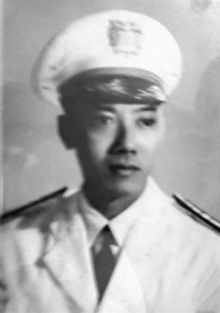
Phạm Ngọc Thảo (IPA: Hanoi: [fâˀm ŋoˀk tʰa᷉ɔ], Saigon: [fə̂ˀm ŋoˀk tʰə᷉ɔ]), also known as Albert Thảo (14 February 1922 – 17 July 1965), was a communist sleeper agent of the Việt Minh (and, later, of the People's Army of Vietnam (PAVN)) who infiltrated the Army of the Republic of Vietnam (ARVN) and also became a major provincial leader in South Vietnam. In 1962, he was made overseer of Ngô Đình Nhu's Strategic Hamlet Program in South Vietnam and deliberately forced it forward at an unsustainable speed, causing the production of poorly equipped and poorly defended villages and the growth of rural resentment toward the regime of President Ngô Đình Diệm, Nhu's elder brother. In light of the failed land reform efforts in North Vietnam, the Hanoi government welcomed Thao's efforts to undermine Diem.
During the First Indochina War, Thảo was a communist officer in the Việt Minh and helped oversee various operations in the Mekong Delta in the far south, at one point commanding his future enemy Nguyễn Khánh, who briefly served the communist cause. After the French withdrawal and the partition of Vietnam, Thảo stayed in the south and made a show of renouncing communism. He became part of the military establishment in the anti-communist southern regime and quickly rose through the ranks. Nominally Catholic, Thảo befriended Diệm's elder brother, Archbishop Pierre Martin Ngô Đình Thục—the devoutly Roman Catholic Ngô family strongly favored co-religionists and had great trust in Thảo, unaware that he was still loyal to the communists. He went on to serve as the chief of Bến Tre Province, and gained fame after the area—traditionally a communist stronghold—suddenly became peaceful and prosperous. Vietnamese and US officials, as well as journalists hostile to or supportive of Saigon, misinterpreted this as a testament to Thảo's great ability, and he was promoted to a more powerful position where he could further his sabotage. Thảo and the communists in the local area had simply stopped fighting, so that the communists could quietly recuperate, while Thảo would appear to be very skillful and be given a more important job where he could do more damage. (Full article...)On this day
May 23: Aromanian National Day
- 1568 – The Dutch Revolt broke out when rebels led by Louis of Nassau (pictured) invaded Friesland at the Battle of Heiligerlee.
- 1873 – The North-West Mounted Police, the forerunner of the Royal Canadian Mounted Police, was established to bring law and order to and assert Canadian sovereignty over the Northwest Territories.
- 1934 – During a strike against the Electric Auto-Lite company in Toledo, a fight began between nearly 10,000 American strikers and sheriff's deputies, later involving the Ohio National Guard.
- 1999 – Professional wrestler Owen Hart died immediately before a World Wrestling Federation match after dropping 70 feet (21 m) onto the ring during a botched entrance.
- Ignaz Moscheles (b. 1794)
- Franz Xaver von Baader (d. 1841)
- David Lewis (d. 1981)
- Luis Posada Carriles (d. 2018)
Selected quote
What is the use of living, if it be not to strive for noble causes and to make this muddled world a better place for those who will live in it after we are gone?
— Winston Churchill, British statesman
Related portals
More Did you know...
- ... that the Japanese aircraft carrier Amagi (wreck pictured) capsized on 29 July 1945 as a result of cumulative damage inflicted by American airstrikes on 24 and 28 July?
- ... that Scandinavian influence in Scotland, still evident today, was probably at its height during the time of Thorfinn the Mighty?
- ... that, after the 2003 invasion of Iraq, the Bassetki statue, which is more than 4,200 years old, was found in a cesspool?
- ... that in medieval art, angels were often depicted wearing feather tights?
- ... that 49% of German military losses happened in the last 10 months of the Second World War in Europe?
- ... that Joshua L. Goldberg, the first rabbi to serve as a World War II U.S. navy chaplain, was a Russian army deserter?
- ... that Richard Nixon chose the Wilson desk as his Oval Office desk because he believed it was used by Woodrow Wilson, informed that it was used by Henry Wilson, Vice President under Ulysses S. Grant, but actually bought by Garret Augustus Hobart, 24th Vice President of the United States under President William McKinley?
- ... that some of the nominally silver Roman coins from the Bredon Hill Hoard only have a 1% silver content?
Topics
Categories

History • By period • By region • By topic • By ethnic group • Historiography • Archaeology • Books • Maps • Images • Magazines • Organizations • Fictional • Museums • Pseudohistory • Stubs • Timelines • Chronology • People • Wikipedia historians
WikiProjects
![]() WikiProject History •
Ancient Near East • Australian History • Classical Greece and Rome • Dacia • Former countries • History of Canada • Chinese history • European history • Heraldry and vexillology • Indian history • Jewish history • Medieval Scotland • Mesoamerica • Military history • Middle Ages • History of Science
WikiProject History •
Ancient Near East • Australian History • Classical Greece and Rome • Dacia • Former countries • History of Canada • Chinese history • European history • Heraldry and vexillology • Indian history • Jewish history • Medieval Scotland • Mesoamerica • Military history • Middle Ages • History of Science
WikiProject Time • Days of the Year • Years
WikiProject Biography • Composers • Political figures • Saints • United States Presidents
Things you can do
 |
Here are some tasks awaiting attention:
|
Associated Wikimedia
The following Wikimedia Foundation sister projects provide more on this subject:
-
Commons
Free media repository -
Wikibooks
Free textbooks and manuals -
Wikidata
Free knowledge base -
Wikinews
Free-content news -
Wikiquote
Collection of quotations -
Wikisource
Free-content library -
Wikiversity
Free learning tools -
Wiktionary
Dictionary and thesaurus










